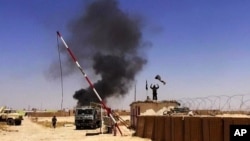A senior U.N. official warns millions of people in Iraq are likely to face severe food shortages because of fighting in the north. The official says the seizure of large swaths of territory by Islamic militants has disrupted the normal harvest season.
The United Nations estimates 1.2 million people are displaced from the conflicts in Iraq between the Shi'ite-led government and Sunni opponents. It says more than half that number have fled their homes since June 9, when the Islamic State of Iraq and the Levant militant group began its campaign to seize control of large parts of northwestern Iraq.
U.N. resident and humanitarian coordinator in Iraq Jacqueline Badcock says the displaced are located in more than 1,400 places in Iraq. Speaking in a video link from Irbil, she said aid workers are concerned about millions of people still trapped in conflict areas, particularly on the Ninevah plains and in the city of Mosul.
She told VOA the country’s food security is of concern because Ninevah is the breadbasket of Iraq.
“It was fortuitously, or unfortunately, whichever way you wish to phrase it, a bumper harvest season this year," she said. "But, with the conflict arising on June 9, people had to flee. Farmers were not paid at the time and since then such things as electricity have been targeted. And, so you have got full silos. But, we cannot mill the flour, which means that the people in the Ninevah region, in Mosul will not have access to this grain as they normally would.”
She says she does not expect a famine, but the chaotic situation in the country will seriously cut down on the amount of available food.
Badcock says in northern Iraq reports abound of women being raped and women and girls forced into marriage. She says she has received reports that ISIL has ordered all female children and women up to the age of 49 to undergo female genital mutilation.
Badcock says up to four million women and girls could be affected by the procedure that is rare in Iraq.
“It did not exist. It does not exist except in very small isolated pockets. This is a fatwa from ISIS," she said. "This is not the will of Iraqi people or the women of Iraq in these vulnerable areas covered by the terrorists.”
Badcock confirms that few Christians remain in Mosul. Most have fled the city following an edict by the militant group they either convert to Islam or pay a fine under pain of death.
She says only about 20 Christian families remain in Mosul, either because they are elderly or too ill to move. She says a few have converted to Islam. Others are paying a fine of about $400, which, she says is a significant sum of money in the area.




